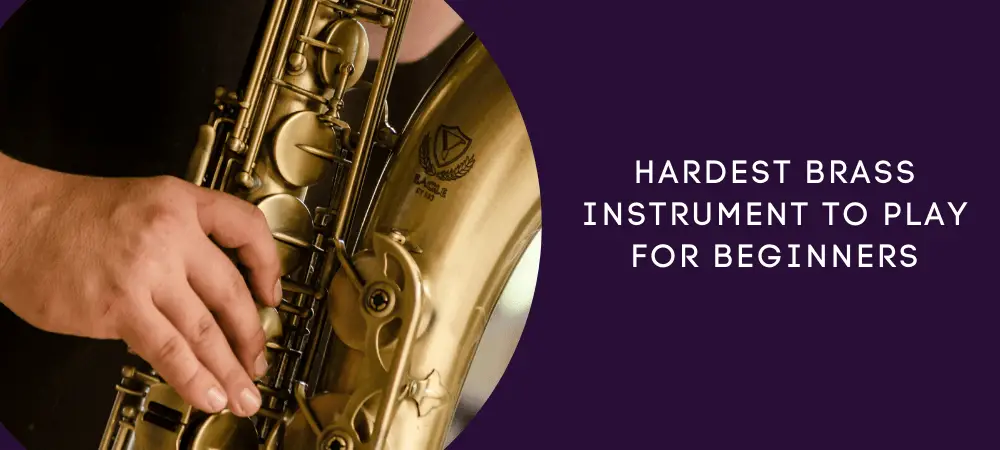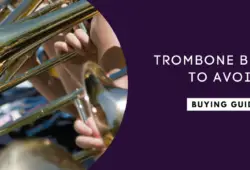If you have been in the music scene for long, then you must have come across various discussions about the easiest and the hardest instruments to learn.
Personally, such questions don’t surprise me anymore.
Especially when more and more individuals are trying to figure out which musical devices make the best investments.
Although most individuals readily argue that there isn’t any hard or easy instrument to learn, there will always be some level of difficulty, depending on individual capabilities.
That’s why, today I am going to take you through some of the top 5 hardest brass instruments to play, with a complete list of what makes them difficult.
Are you ready to learn? Let’s get right into it!
Table of Contents
Hardest Brass Instrument to Play
1. French Horn
This is the hardest instrument to learn on this list.
When you watch musicians play the French horn, you might be fooled into assuming that it’s so easy to play. While experts make it appear easy, it definitely isn’t the case.
But why?
Closer Notes: One thing that’s widely known about the French horn is the fact that it ranks high up in the harmonic series as compared to other instruments within its range.
And this is because this instrument’s notes are closely placed together.
So, for a player or learner to successfully produce great sounds, they need excellent listening skills. And this takes time and a lot of patience.
Cracked Notes: the mere thought of listening to a cracked musical note is squirming. And although no player wants to experience this, it’s, unfortunately, a common occurrence when playing the French horn.
Therefore, players should always be on guard, well-equipped with various combating skills, whenever those horror sounds strike. Those techniques aren’t easy to learn.
Rarely Forgives: when you compare the French horn to other similar instruments, you will realize that it rarely forgives mistakes. This is because it produces a high pitch, and the notes are close together.
So, even the slightest errors come out profoundly. A good player, therefore, needs to be almost perfect!
I am saying almost, because really no one is perfect, and mistakes do occur. But if possible, you just have to focus on being an ideal French horn player.
Difficult to Locate Water Droplets: like any other wind instrument, French horns do collect a lot of saliva and vapor when you play. The only difference, however, is that it stores a lot of it.
And due to the complex nature of its tubing, it’s almost impossible to locate the moisture and examine the seriousness.
You have to spend a lot of time taking out its parts, which could rob you more of your playing time, especially if you’re working on a tight schedule.
2. Trumpet
Trumpets might be gorgeous and all, but they aren’t the easiest to play, especially in the beginning.
Yes, I know this statement might seem exaggerated for excited learners, as its outward appearance isn’t intimidating at all.
But once you begin playing, you will realize over time how difficult it really is.
And musical tutors/experts attribute this to the following:
Constant Practicing: whenever you’re learning a new instrument, it’s normal to practice for long.
Take, for example, the piano or guitar. It’s pretty easy to keep practicing for up to 6 hours straight.
But when it comes to the trumpet, the story is totally different. Long hours of practice might cause harm to your health.
In fact, you will realize by yourself that laying for long is impossible. You will just get tired and have to build your stamina with time patiently.
And if you try to force it, your lungs won’t like it. So, players have no choice but to get sufficient breaks to re-energize.
Not Easy to Learn From Tutorials: I know in my previous articles I have written that you can literally self-learn any musical instrument using online tutorials.
But this is almost impossible with the trumpet. You will need proper tutor-led lessons if you want to be really good at it.
A tutorial won’t show you how to make the right lip movements correctly. It will also do nothing to help you maintain realistic breathing patterns. Only a tutor can.
For example, when you try to exert too much or too little air, a professional will point it out.
And that means you should be ready to spend. So, this might be challenging for on-budget learners.
They Are Loud: if you’ve ever listened to a band playing and there’s a trumpet involved in the list of instruments, then you must have noticed how loudly it comes out over other devices.
While that’s exciting for listeners, most composers try to balance everything.
And as a result, they might, from time to time, request trumpet players to use an octave lower than the other instruments.
In this case, you have no choice but to hold your breath and keep controlling it throughout the performance.
So, you can imagine how it feels like to control your breath while letting out the significant amount of volume, not so easy, right?
Another thing, because of its loud sound, it’s easy for people to notice the mistakes you make as compared to other instruments.
Multiple Melody Manipulation Aspects: for you to play the piano, you simply have to press the keys using different amounts of pressure to achieve the desirable tunes. But, when playing the trumpet, you have to incorporate multiple aspects for tone production.
For instance, you will have to master the fingering of the 3 buttons, the lip vibrations that depend on the shape of your mouth, your lip tension, among other factors.
So, everything has to be well-balanced for a perfect tone. And that requires a lot of practice sessions and, of course, a qualified teacher.
Hard to Tune: tuning a trumpet isn’t as easy as picking it up and blowing into it. You have to master the art of doing it, such that it doesn’t come out as either too sharp or loud.
And most beginners, I have spoken to confess that it’s an uphill task. More challenging than they expected.
And even with the invention of modern electronic tuners, which have softened everything up for learners and players, you still have to master the basic skills.
3. Trombone
This musical instrument might be a member of the brass family, but it’s a little different from the rest.
It mainly uses a big slide instead of the standard valves, although you can currently find some trombones which use valves to enhance thumb extensions.
When you see the trombone being used as a solo piece in band performances, you might think that all you need to do is pick up and achieve the perfect tunes within a short time.
But even if playing this device isn’t as difficult as it would be to learn the French horn and the trumpet, it isn’t the easiest either.
And this is because:
No Valves: instead of having valves that players can quickly push using the tips of their fingers while playing, trombone learners have to use a slide.
And in this case, it’s the slide that’s used to change pitches.
It’s, therefore, quite challenging to achieve the desirable tunes, especially when dealing with speedy passages.
Yes, you can do it, but you will always have to be careful not to touch the cornet when its agility and speed levels are high.
And be ready to have your slide come off. It usually does at one point, and it can be terribly embarrassing in solo performances.
Not Very Lightweight: sometimes, as a trombone player, you will be required to play for long hours.
Although the instrument isn’t as demanding as the trumpet, in terms of the amount of embouchure strength required, you will also have to be robust and well-developed.
Well, if you want to withstand long performance sessions.
Emptying the Spit Valve Isn’t Quite Tasking: the standard brass instruments routine demand that you empty your device of any moisture and saliva from time to time. In fact, this should be after every performance.
Due to its shape, the trombone tends to store a lot of spit. And will generally have to dissemble it for a quick clean-up session before fixing it again.
And the routine can be tiring for beginners. Besides, even your spits aren’t the best sight.
Not Easy to March and Play Simultaneously: marching bands might be a tantalizing sight for onlookers, but most trombone players confess that they need resilience to keep going.
You have to learn how to multi-task, and that isn’t easy to do. It even gets more challenging when swords are involved.
Being in Tune is Hard: well, experienced players can argue that tuning the trombone is the easiest to achieve, simply because the slide is usually theoretically automatically adjustable with the perfect resonance.
But, you have to achieve the perfect positioning to play correctly immediately. And you will need more time than you think to train that arm muscle.
Requires Special Tonguing Skills: the trombone has a larger mouthpiece, and with the slide, it’s difficult to achieve balance as compared to the smaller trumpet mouthpiece.
Remember, you will have to control every note with your lips. And then the vibrations don’t make it easy for players to achieve balance.
Therefore, it might take a lot of progress before your mouth muscles get used to the large size and then offer the much-needed precise control of the buzz.
4. Tuba
Playing the tuba might not be as hard as playing the French horn or the trumpet, but it does require special skills, which aren’t easy to achieve.
Therefore, I would say that this instrument is relatively difficult for various reasons:
Large Mouthpiece: the Tuba’s mouthpiece is ranked as the largest in the brass family. Do you know what that means?
You will have to pass more air through it. And doing that is the most challenging part if the confessions by ex-students have anything to do with it.
First, you will have to learn how to loosen your lips to produce those raspberry sounds. And you will have to lug it around without using your tongue.
Obviously, in the beginning, your mouth muscles will give you a hard time, but you will get used to it with time.
In fact, some individuals confess that they find it easy to play bid-mouthed brass instruments as opposed to small-mouthed ones. I guess it boils down to individual preference.
Requires Great Lung Power: Because of the more pipework that comes with the Tuba (it’s both long and wider), you will require a lot of breath to keep playing. This means that controlling the tunes isn’t going to be easy.
In the beginning, you will find yourself getting exhausted pretty fast. So you will need to take time off to re energize before practicing again.
The last thing you want is to overload your lungs.
If you desire to perfect your skills with a few days or weeks, you will have to lay that aside for now. Remember, too much strain can cause health problems, especially where your vital respiratory organs are concerned.
They’re Big: the standard Tuba weighs around 13.6 Kilograms. So you will be typically holding it across your laps, even as you play.
And if you will be playing in a marching band, then wrapping them around your shoulders will be the order of the day.
Therefore, it can become unbearably heavy, especially if you have a small body frame and have to play for long hours. This explains why most school bands rarely use it in their performances.
Still, on the bulkiness of the Tuba, you also can’t simply carry it anywhere you want for practice. And this can be a bit challenging for learners who are always on-the-move.
5. Euphonium
The Euphonium is like a smaller tuba.
It’s therefore quite easy to play as compared to the Tuba. And because of this, kids who want to learn Tuba use it first, because of their smaller lung capacity.
This musical instrument produces a pleasing sound and is often used to play lyrical tunes in the highest register. And it’s for this reason that the Euphonium (though small) isn’t considered as one of the easiest brass instruments to play.
Requires Flexibility: The other reason that makes this musical device hard to play is that it needs players to be very flexible and robust.
Lyrical passages demand a robust embouchure from time to time, and it takes time to master.
Tonguing Techniques: apart from being flexible, you will also have to apply various tonguing techniques to produce multiple desirable tones.
And that’s not all. Your lips have to buzz correctly, in alignment with the fingering, which isn’t easy.
Music Sheet Reading: this is a common challenge for beginner euphonium players. To effectively balance between reading the sheet music and playing isn’t easy, especially when playing in a band.
FAQs About The Hardest Brass Instrument to Play
Is French Horn Harder Than Trumpet?
Yes. The French horn is usually harder to play than the trumpet. And this is because its comfortable range is ranks highly in the overtone series.
So, as you play, you will notice that the notes feel too close together, making it easy for players to crack a not or even miss it altogether.
Is Tuba Hard to Learn?
Tuba might not be as hard as the French horn to learn, but it isn’t easy either.
They have a large mouthpiece and are massive, making it difficult for a beginner to balance the tunes as they carry the weight.
But with patience and persistence, you can learn how to play it, although it won’t be as faster as learning how to play the piano or a guitar.
What Is the Hardest Brass Instrument to Play in A School Band?
The Tuba so far the hardest brass instrument to play in a school band.
It’s difficult to play while marching, and it is pretty heavy, making it hard to balance between a firm hold and playing as you march.
Conclusion
Brass instruments are undoubtedly gorgeous when your judgment is based on their outer appearance and the sounds they produce.
But even with this beauty, some of them are difficult to play, especially for beginners.
The above list contains 5 of the hardest brass instruments to play, and by now you should know which ones to avoid if you want everything all smooth and easy.
I would, however, want to emphasize one thing: no matter how hard an instrument is, you can always learn your way around it so long as you’re determined to.
So, I hope you won’t feel threatened by this list. Instead, get motivated by it to try out something challenging in your musical life.
Remember, our aim isn’t to scare you but to inform you. And whatever doesn’t work for others might be the easiest for you. You simply have to trust your instincts and push forward.
Therefore, whatever you decide, go for it. If others made it, then so can you!




